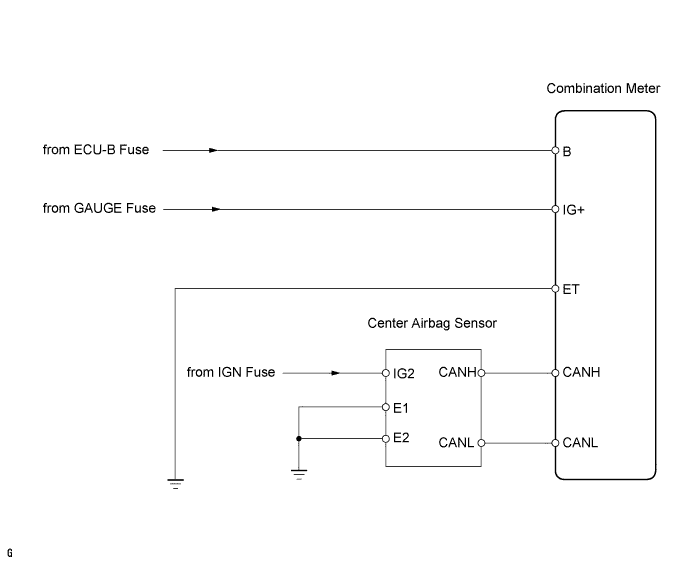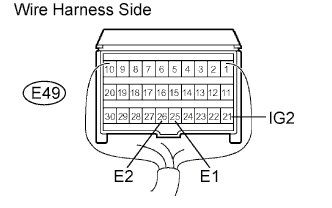CHECK WIRE HARNESS (SOURCE VOLTAGE OF CENTER AIRBAG SENSOR ASSEMBLY)
CHECK WIRE HARNESS (SOURCE VOLTAGE OF COMBINATION METER)
AIRBAG SYSTEM - SRS Warning Light Remains ON |
DESCRIPTION
The SRS warning light is located on the combination meter.When the SRS is normal, the SRS warning light comes on for approximately 6 seconds after the ignition switch is turned from off to on (IG), and then goes off automatically.
If there is a malfunction in the SRS, the SRS warning light comes on to inform the driver of a problem.
When terminals TC and CG of the DLC3 are connected, the DTC is displayed by blinking the SRS warning light.
The SRS is equipped with a voltage-increase circuit (DC-DC converter) in the center airbag sensor in case the source voltage drops.
When the battery voltage drops, the voltage-increase circuit (DC-DC converter) functions to increase the voltage of the SRS to normal voltage.
A malfunction in this circuit is not recorded in the center airbag sensor. The SRS warning light automatically goes off when the source voltage returns to normal.
The signal to illuminate the SRS warning light is transmitted from the center airbag sensor to the combination meter through the multiplex communication system.
WIRING DIAGRAM

INSPECTION PROCEDURE
| 1.CHECK BATTERY |
Measure the voltage of the battery.
- Standard voltage:
- 11 to 14 V
|
| ||||
| OK | |
| 2.CHECK CONNECTOR |
Turn the ignition switch off.
Disconnect the cable from the negative (-) battery terminal, and wait for at least 90 seconds.
Check that the connectors are properly connected to the center airbag sensor and combination meter.
- OK:
- The connectors are properly connected.
|
| ||||
| OK | |
| 3.CHECK WIRE HARNESS (SOURCE VOLTAGE OF CENTER AIRBAG SENSOR ASSEMBLY) |
 |
Disconnect the E49 connector from the center airbag sensor.
Connect the cable to the negative (-) battery terminal, and wait for at least 2 seconds.
Turn the ignition switch on (IG).
Operate all components of the electrical system (defogger, wipers, headlight, heater blower, etc.).
Measure the voltage of the wire harness side connector.
- Standard voltage:
Tester Connection Specified Condition E49-21 (IG2) - Body ground 10 to 14 V
Turn the ignition switch off.
Measure the resistance of the wire harness side connector.
- Standard resistance:
Tester Connection Specified Condition E49-25 (E1) - Body ground Below 1 Ω E49-26 (E2) - Body ground Below 1 Ω
|
| ||||
| OK | |
| 4.CHECK WIRE HARNESS (SOURCE VOLTAGE OF COMBINATION METER) |
 |
Disconnect the cable from the negative (-) battery terminal, and wait for at least 90 seconds.
Disconnect the E22 connector from the combination meter.
Connect the cable to the negative (-) battery terminal, and wait for at least 2 seconds.
Turn the ignition switch on (IG).
Measure the voltage of the wire harness side connector.
- Standard voltage:
Tester Connection Condition Specified Condition E22-21 (IG+) - Body ground Ignition switch on (IG) 10 to 14 V E22-22 (B) - Body ground Always 10 to 14 V
Turn the ignition switch off.
Measure the resistance of the wire harness side connector.
- Standard resistance:
Tester Connection Specified Condition E22-33 (ET) - Body ground Below 1 Ω
|
| ||||
| OK | |
| 5.CHECK SRS WARNING LIGHT |
Turn the ignition switch off.
Disconnect the cable from the negative (-) battery terminal, and wait for at least 90 seconds.
Connect the E22 connector to the combination meter.
Connect the cable to the negative (-) terminal, and wait for at least 2 seconds.
Turn the ignition switch on (IG).
Check the SRS warning light condition.
- OK:
- After the primary check period, SRS warning light goes off for approximately 10 seconds, and turning it on is continued.
- HINT:
- The primary check period shows approximately 6 seconds after the ignition switch on (IG).
|
| ||||
| OK | ||
| ||